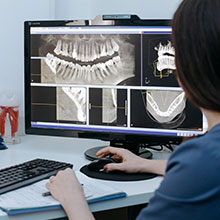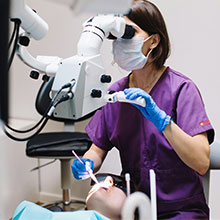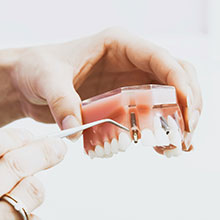Dentures
Dentures are removable false teeth designed to restore your smile and improve everyday functions like eating and speaking.
They can also enhance facial shape, especially around the lips and cheeks, preventing a sunken appearance caused by missing teeth.
There are two types of dentures:
Partial dentures – Replace one or a few missing teeth
Complete dentures – Replace an entire set of teeth in the upper or lower jaw
Dentures are typically made from acrylic or a combination of acrylic and metal.
Thanks to modern materials, partial dentures blend seamlessly with existing teeth, and full dentures can look very natural.
Benefits of Dentures
Provide a natural-looking smile
Help maintain facial structure and prevent sagging
Improve eating and speaking ability
An affordable and effective way to replace missing teeth
Treatment Steps
Getting dentures is a detailed process that requires several appointments to ensure a comfortable and secure fit.
- Consultation and Impressions – Your dentist will assess your oral health and take impressions of your mouth to create a wax model of your dentures.
- Trial Fitting – The wax model is checked for fit, bite, and comfort to make sure the final dentures will be a perfect match.
- Final Denture Fabrication – Your custom dentures are made in a dental laboratory.
- Denture Fitting – Once ready, your dentures are fitted and adjusted for comfort.
- Follow-Up Appointment – After wearing your dentures for a week or so, you will return for a review to ensure they fit properly and function well.
Types of Dentures
Partial dentures – Held in place with metal hooks attached to natural teeth, replacing one or several missing teeth.
Complete dentures – A full set of prosthetic teeth attached to a gum-coloured arch, fitted to the upper or lower jaw.
Adjusting to New Dentures
It takes time for your mouth to adjust to dentures, especially if you are wearing a full set. Here are some common experiences:
- Initial discomfort – Dentures may feel strange at first, but your mouth will adjust over time.
- Eating adjustments – Start with soft foods and gradually introduce more solid foods as you get used to chewing.
- Increased saliva – This is normal and should reduce as your mouth adapts.
- Speaking difficulties – Reading aloud can help improve speech clarity.
- Sore spots – If you experience any discomfort, your dentist can adjust the denture surface for a better fit.
Denture Aftercare
Dentures are durable, but proper care will help them last longer:
- Remove dentures before bedtime to give your gums a rest.
- Store them in water or denture solution to prevent them from drying out.
- Clean daily with a soft toothbrush or denture brush to remove food and plaque.
- Keep your gums and any remaining natural teeth clean.
- Visit your dentist for regular check-ups to ensure your dentures fit well and your mouth stays healthy.
With the right care, dentures can provide a comfortable and long-lasting solution for missing teeth.
If you are considering dentures, The Smile Avenue Dental Clinic can help you find the best option for your needs. Book a consultation today!




